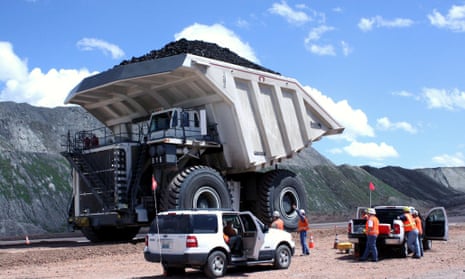An executive from a mining company has been interrupted during a speech to a G20-related energy forum in Brisbane by protesters chanting “we don’t want your coal”.
Glenn Kellow, chief operating officer of the American company Peabody Energy, which was reprimanded in August by the UK’s advertising regulator over a “misleading” public relations campaign, was speaking at an event on Wednesday promoting the use of coal.
But Kellow, who credited Peabody’s campaign with prompting 500,000 people to lobby G20 leaders on the issue of “energy poverty”, was interrupted by activists from the Australian Youth Climate Coalition.
“Peabody, we don’t want your coal. Peabody, you don’t belong at G20,” they chanted before voluntarily leaving.
Peabody, which is the world’s largest privately owned coal miner, sponsored the event, titled “Growth engine: capitalising on energy’s full growth potential”. It was part of a “thought-leadership forum” to coincide with G20.
Earlier, a coalition of religious leaders issued a statement critical of Peabody’s role in a fossil fuel lobby “resisting the call for change” on energy policy.
The Australian Religious Response to Climate Change (ARRCC) said the lobby in Brisbane was “actively promoting the message that fossil fuels are an indispensable necessity if developing countries wish to lift their people out of poverty”.
Rabbi Jonathan Keren-Black said this was a “biased claim from an industry that is fighting for its own survival”.
Anglican Bishop Stephen Pickard said some G20 leaders claimed to be “people of faith, yet their collective failure to act on climate change is morally reprehensible”.
Kellow omitted climate change when speaking of some of “the most pressing” issues to be discussed at G20, instead listing “economic growth, global poverty, geopolitical insecurity and endemic threats”.
He said “access to energy plays a vital role in addressing each of these issues – which challenge deserves the most urgency depends on individual perspective”.
“We must acknowledge that each fuel has inherent strengths and challenges but that we will need all forms of energy … renewables, nuclear and fossil fuels, with oil, gas and coal playing an important role,” he said.
Kellow said there would be “more wind, more solar, more gas, and yes, more coal”.
Peabody’s “advanced energy for life” campaign was found to be “misleading” by the UK’s Advertising Standards Authority because its use of the term “clean coal” could allow reductions in air pollution to be confused with those in carbon dioxide emissions.
AYCC organiser Kirsty Albion said Peabody’s publicity campaign – which comes at a time of stalling growth and greater regulation in its home US market – was “a laughable and desperate exercise from an outdated industry”.
AYCC joined 30 other youth climate activist groups worldwide to issue an open letter to G20 leaders to “resist the voice of the coal lobby”.
“We are compelled to write this letter because we believe that the coal lobby, led by Peabody Energy, is trying to unduly influence the outcome of the G20 Summit,” it reads.
“They claim that their industry will benefit the world’s poor. But we know that the rapid expansion of the industry will cost those living under the poverty line their health and clean air – and they are also the most vulnerable to the impacts of climate change.”
US energy analyst Matt Rogers, who also spoke at the forum, told Guardian Australia that present progress towards a sustainable future energy mix worldwide was like being “in the first hour of a five day cricket match”.
“But on every analysis, coal has a long term future,” he said, citing both the cost of early adoption of renewable technology and increasing efficiency of coal fired power.

Comments (…)
Sign in or create your Guardian account to join the discussion